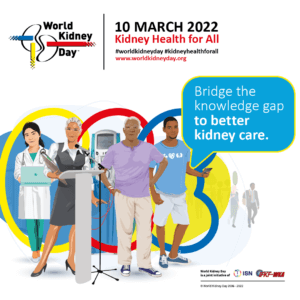 Imagine feeling sick one day, so sick in fact that you decide to visit the local emergency room. Imagine then learning that the reason you are feeling sick is because you have advanced stage kidney disease.
Imagine feeling sick one day, so sick in fact that you decide to visit the local emergency room. Imagine then learning that the reason you are feeling sick is because you have advanced stage kidney disease.
This scenario is all too common when it comes to kidney disease. The National Institute of Health estimates that as many as 9 in 10 people with chronic kidney disease in the U.S. do not know they have the disease. And for many people, no symptoms appear until their kidney disease is advanced.
One afternoon in 2005, Ed Gray had such an experience. He told his wife Chris that he didn’t feel well, and asked her to take him to the emergency room. Ed was admitted upon arrival and spent the next 17 days in the ICU in a coma. He experienced multiple system failures including failure of his kidneys. He learned in the hospital that he had kidney disease and would need dialysis.
Kidney disease can surprise people because it often has no obvious symptoms. Early detection is significant. The disease can be slowed or sometimes even stopped with diet, exercise, medications and lifestyle changes.
Diabetes and high blood pressure are the two leading causes of kidney disease. By effectively managing these conditions, you can contribute greatly to the long-term health of your kidneys.
Other risk factors include a family history of kidney disease, and being African American, Asian American or Native American. People who are overweight and those over age 60 are also at risk. Know your risk–take the quiz at www.nwkidney.org/quiz.
“People with a risk factor for kidney disease should ask their doctors to check their blood pressure and do appropriate lab tests to check their kidney health,” said Dr. Suzanne Watnick, chief medical officer at Northwest Kidney Centers.
Tips for keeping your kidneys healthy
- Follow prescribed treatments to control diabetes and/or high blood pressure.
- Eat a kidney-friendly diet (low or no salt). Learn more about a kidney-friendly diet and recipes here.
- Attend one of our Eating Well, Living Well classes to learn how to make changes to your diet. Visit our class listings.
- Stay active. Find ways to exercise that you enjoy and check with your doctor about exercising safely for you.
- Avoid overuse of over-the-counter pain medicines or prescription medicines.
